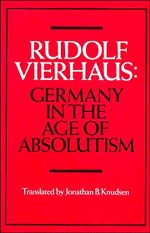2 - Society
Published online by Cambridge University Press: 05 June 2012
Summary
PRELIMINARY REMARKS: ENCRUSTATION AND DYNAMIC ELEMENTS
The return to population growth, the recovery of agriculture and industry, the reconstruction of destroyed cities, the rebuilding and expansion of trade – though begun haltingly and unevenly, these represented a considerable achievement after the Thirty Years War on the part of peasant and lord, artisan and entrepreneur, magistrate and state. The achievement seems all the greater since the postwar period was in no way a time of lasting peace. The European wars of the century after 1648 no longer took place predominantly on German soil, but they did periodically reach deep into imperial territory, particularly those conflicts between France and the Habsburgs. The Palatinate was systematically laid to waste in one of those encounters during the 1690s. Other obstacles to sustained recovery and long-term socioeconomic development derived from the increased territorialization of the empire. Economic policies and recovery programs ended strictly at the borders of the particular states and were primarily fiscal in orientation. Active governments especially sought to discipline their subjects. If the motives were often benevolent and strengthened by the religious belief that humankind should be maintained within a rigid order and raised to a life of industry and work, these policies also eventually stifled individual, corporate, and local independence and accustomed society to administrative control. Even more important, the war had caused immeasurable change in the structure of the population and the patterns of property holding.
- Type
- Chapter
- Information
- Germany in the Age of Absolutism , pp. 31 - 57Publisher: Cambridge University PressPrint publication year: 1989



